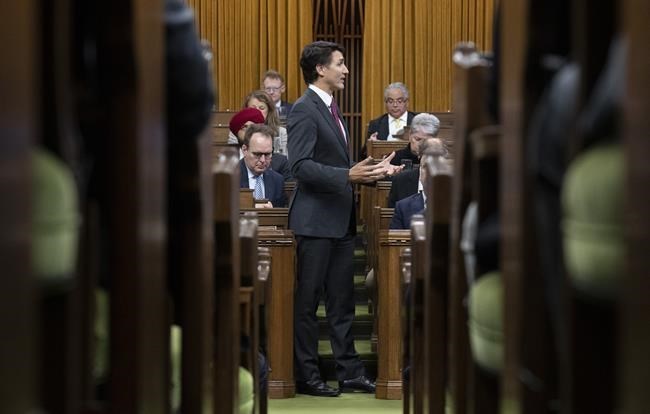OTTAWA — Members of Parliament will return to their seats in the House of Commons on Monday as the governing Liberals lay out new housing and cost-of-living initiatives hoping to end the beating their party is taking in the polls.
While the Conservatives, whose own poll numbers are shining, return with a spring in their step, the Liberals are faced with their worst poll numbers in eight years and an electorate looking for a sign the government both understands and can help ease the money woes keeping them up at night.
Deputy Prime Minister Chrystia Freeland, who has been criticized for spouting bland talking points about Canada's post-pandemic economic growth in response to questions about inflation, appeared to acknowledge that pressure Saturday.
Speaking at a summit for progressive international leaders in Montreal, Freeland said Canada's efforts to survive the pandemic's economic blows intact are important, but they're meaningless to a family trying to put food on the table today.
"For Canadians who are worn out and frustrated, having been through a very great deal over these past three years, I know that a recounting of battles fought and won is tedious if not outright repellent," she said.
"What Canadians want and need and deserve is for us to address the very real pain so many are facing right now, and to offer a hopeful and achievable vision for Canada's future."
So far the Liberals have responded to pleas for help with the cost of living crisis by delivering two top-ups to the GST rebate — each worth up to $467 for a family of four — and a single $500 housing benefit for low-income renters. The NDP wants the Liberals to offer the housing benefit again this fall.
Meanwhile, the annual Canada Food Price Report from Dalhousie University shows the average family of four saw their annual food bills rise by about $2,000 between 2020 and 2022. The 2023 report predicted another $1,065 increase this year.
The Liberals are now turning to the retail sector for help to bring food costs down. At the same time as the House of Commons reopens on Monday morning, Industry Minister François-Philippe Champagne will be meeting with the CEOs of Canada's biggest grocery chains, insisting they come up with a plan to ease food prices by Thanksgiving.
The heads of Loblaws, Metro, Sobeys, Walmart Canada and Costco were invited to the meeting. Prime Minister Justin Trudeau warned last week that if the retailers can't show a path to lower prices, the government may take steps to force the issue.
NDP Leader Jagmeet Singh, whose party has an agreement with the Liberals to support the government on key votes in exchange for government action on some NDP priorities, has long pushed for a windfall tax on grocery outlets making record profits.
Conservative Leader Pierre Poilievre, speaking to reporters on Parliament Hill Sunday, dismissed the Liberal grocery meeting as a political photo op.
"Will lettuce prices be back down to their original price by Thanksgiving," he asked. "Will carrots be back down to their original price by Thanksgiving because of this big photo op he's holding with grocery store CEO's? This is more political theatre."
Poilievre said he would address the cost of food by eliminating the carbon price. That price is not applied directly to groceries but it can indirectly raise costs of production and transportation of food.
The Bank of Canada said this month the carbon price contributes about 0.15 percentage points to inflation overall. That amount was the same whether inflation was at its peak of 8.1 per cent in June 2022 or 3.3 per cent in August.
Housing has become the other major concern for Canadians of late — a recent Leger poll suggested one-third of Canadians listed inflation as their number one issue, with about one-sixth saying housing affordability.
That affordability issue is driven in large part by a lack of supply. The Canada Mortgage and Housing Corporation says Canada needs to increase its home building plans by 3.5 million homes by 2030.
Incentivizing construction, particularly of rental units, is also critical. The Liberals are heading into the parliamentary session toting a new promise to remove the GST from the construction cost of new rentals.
Mike Moffatt, an economist and housing expert at the Smart Prosperity Institute, helped co-author a report in August advising the federal government on options for solving the housing crisis. Removing the GST from new rental construction was on his list and he anticipates it could add between 200,000 and 300,000 rental units in Canada by 2030.
Poilievre intends Monday to introduce legislation with new housing policy that also includes removing the GST. He also intends to promise extra cash to cities that increase their housing starts, while those that don't would see their federal housing dollars diminished.
Poilievre said Liberal housing programs, like an accelerator fund which funnels money to cities that break down barriers to building new homes, are heavily bureaucratic with limited success.
He insisted his plan would come without any paperwork for cities.
The Liberals see vulnerability in the Conservatives on climate, with Poilievre thus far not explaining what his climate change plan would look like beyond cancelling the carbon price.
Environment Minister Steven Guilbeault sharpened his attacks on Poilievre over the summer as the world saw record high temperatures and Canada watched millions of hectares of forest, and hundreds of homes, razed by wildfires.
The Liberal-Conservative battle over energy and environment policy will heat up again next month when Guilbeault is expected to show his plan to cap emissions from oil and gas production.
Monday also marks the official start of the public inquiry into foreign interference. It's not clear yet when public hearings will be held, but the first report is due at the end of February.
This report by The Canadian Press was first published Sept. 17, 2023.
Mia Rabson, The Canadian Press




